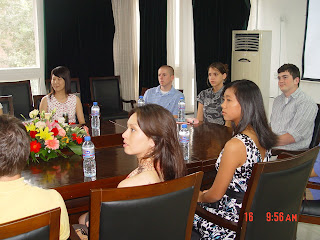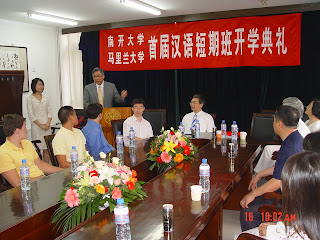In the first week, students had language classes for five days. In addition, they learned TaiChi, Chinese Opera, and Wu Shu.
After a week of studying with textbooks, the class
traveled to
Qufu (曲阜)- the birth place of Confucius (孔子) ,
ZouCheng (邹城)- the hometown of Mencius (孟子), and Mount
Tai (泰山) during the first weekend in China.
Qufu was full of tourists because Confucius (551 - 479 B.C.) was the most influential scholar, educator, and philosopher in the
Chinese history. His tomb, temple and residence showed us how highly he has been respected by all the
emperors from Song (宋) through
Qing (清) dynasty.
 ZouCheng
ZouCheng, in comparison, is not as well visited. We had
difficulties finding the site because the signs were not as clearly displayed to direct the tourists. Nonetheless, I am glad we went to Mencius home town. The relationship between Confucius and
Mencius is like that of
Socrates and
Aristotle in the Western civilization. It is also similar as
Mendelssohn revived J.S. Bach's music in music history. Without Mencius's effort, the
Confucianism won't be as widespread as it is today.
One of my students said that Mount Tai (1,545 m. above sea level) took his breath away and that as he sat above the clouds he came to realize why Tai Shan is world renowned.

There are
abundant scripts written into the boulders by famous scholars or
emperors.

The incense sticks are especially long for faithful people, including our students. On our way up, I talked to a woman who sat next to me in the bus. She said she couldn't have children after getting married for five years. So, she climbed the 6,600 stairs of Mount
Tai to pray to the Goddess 22 years ago. Her daughter is now studying in a college in Kansas, USA. She (the mother), who lives over 600KM away, came back to thank the Goddess. Apparently, lives of Chinese people still associate with superstitions.

Nan
Tian Men (南天门) has been seen as the gate to heaven. It took us about 30 minutes to climb to the top of
the mountain from this point.

After a week of Tianjin smog, we really enjoy breathing the fresh air on Mount
Tai!!!





 We took yet another group picture before leaving the museum complex. The next stop was
We took yet another group picture before leaving the museum complex. The next stop was 





 In the morning of the last day in
In the morning of the last day in 
 Before boarding train to return to Tianjin, we also visited a mosque. I learned that even in China, these
Before boarding train to return to Tianjin, we also visited a mosque. I learned that even in China, these 




 Monica as an empress.
Monica as an empress.
 Monica and James played a married couple in their wedding dresses
Monica and James played a married couple in their wedding dresses Brett played a Robin-Hood type of hero
Brett played a Robin-Hood type of hero Monica and Joe are
Monica and Joe are 


 The Structure of the Forbidden City impressed our students enormously
The Structure of the Forbidden City impressed our students enormously  A Dragon Turtle in the Forbidden City 故宫里的龙龟
A Dragon Turtle in the Forbidden City 故宫里的龙龟 The Mao Mausoleum 毛泽东纪念馆
The Mao Mausoleum 毛泽东纪念馆 The Summer Garden 颐和园的神牛
The Summer Garden 颐和园的神牛 Tiananmen Square 天安门广场
Tiananmen Square 天安门广场
.JPG)


















